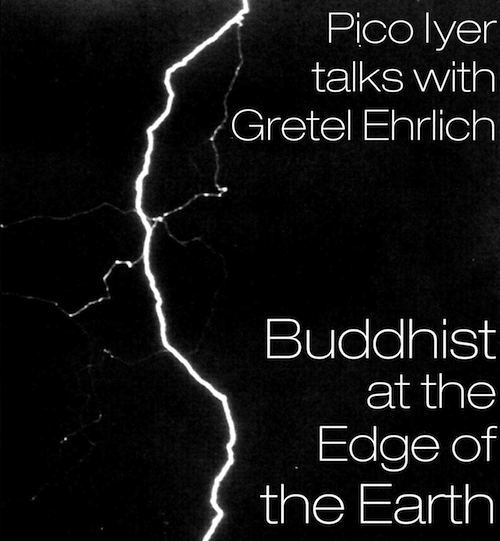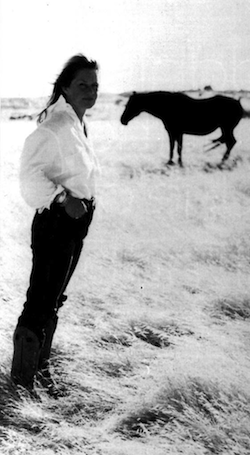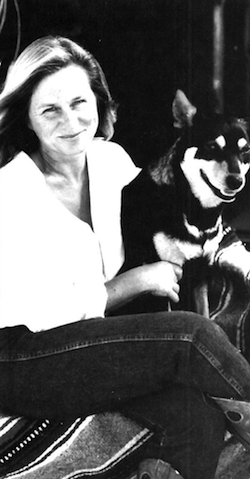
When Gretel Ehrlich burst onto the literary scene in 1985 with a book of essays about Wyoming, The Solace of Open Spaces, she was instantly compared to Thoreau and Whitman. Her open heart, her free-floating adventurousness, her celebration of the here and now, all drew her to find her teachers in the silent farm hands of the West and in the wild. Through her novel Heart Mountain, a sympathetic portrayal of the Japanese held in American internment camps during World War II, and another book of essays, Islands, the Universe, Home, it became apparent that she had learned much from the wandering priests of Japan and from all those poets and scientists who find no rift between the nature within us and without. She belongs to that tradition of American writers—from Gary Snyder to Jim Harrison, from Peter Matthiessen to W. S. Merwin—who write of spirit when they write of nature, fashioning parables of impermanence and death from the matter of their daily lives. Yet she never wrote explicitly about her Buddhist practice until her most recent and startling book, A Match to the Heart, the story of how she was struck by lightning for the second time in her life, was left for dead and, coming back to a state of semiconsciousness, took residence in a kind of bardo state.
Born in 1946 in Santa Barbara, California, Ehrlich was educated at Bennington College and U.C.L.A. Film School. In 1976 she went to Wyoming to make a film and stayed there 15 years as a rancher. She now lives in an isolated two-room cabin tucked into the hills along the California coast. Recently she met withTricycle Consulting Editor Pico Iyer in Santa Barbara and talked for the first time about her life as a “closet Buddhist.”
Tricycle: People associate you with solitude and isolation, and living in the wild. But you found a way to integrate your thoughts about Buddhism with this relatively secluded setting.
Ehrlich: The point is that the teachings become a part of your life and that you live them out as best you can, in your faltering, stupid, flawed way. But to put it out there in print is to say, “This is what I’m really about.” It just seemed totally inappropriate to even mention that I was a Buddhist practitioner. But inevitably people who are practitioners see it, and they come up and say, “Are you really a closet Buddhist?” So now I’ve come out of the closet.
Tricycle: How did you first get interested in Buddhism?
Ehrlich: I found D. T. Suzuki’s books on Zen Buddhism when I was about fourteen and at boarding school. I was in the choir, but I didn’t believe in God. I put the D. T. Suzuki inside the hymnal and read in chapel. Later I went up to San Francisco Zen Center and met Suzuki Roshi, and went to Tassajara once. Then I met with Trungpa Rinpoche. We sat and talked, and then he kind of smiled and said, “I wish you would come to Boulder and live in my house with me, and some other people, for a while.” So I said, “Oh, okay!”—not having any idea of what I was getting into.
Tricycle: What did you get into?
Ehrlich: There were four of us living there, and his wife, and they had one child then, and we virtually did nothing for seven months. Hung out. He liked to play Monopoly. And we talked.
Tricycle: Teaching was in being with him?
Ehrlich: Yes. The teaching was all the time. You could say that the subtext of the teaching was that dharma isn’t special, that it’s ordinary. The extraordinary and the ordinary are the same thing, and to play Monopoly with a teacher is just the same as sitting all day. And we also had two- or three-day sesshins—just sitting practice. We started talking about developing some kind of community, so that the teachings could have a home, and he wanted me to be involved in that more than I wanted to be, so I just said no.

Tricycle: Because you didn’t want to be pinned down or fixed to the place?
Ehrlich: I wasn’t interested in joining a group where everyone follows the same thing. And Rinpoche kept saying, “It doesn’t make any difference. Who cares who’s there?” But I’d get antsy. I always came and saw him, though, and I took bodhisattva vows—refuge vows. Reluctantly, of course. Always kicking and screaming. He kept saying, “Oh, it’s okay. Don’t worry about it.”
Tricycle: It sounds like what you got out of Trungpa Rinpoche was that sense that everything is teaching, and whatever you’re doing can be practice.
Ehrlich: Yes, and that’s a wonderfully liberating thing. As a teacher that’s what was so extraordinary about him. The whole “crazy wisdom” path was pulling the rug out from under people’s ideas about what spiritual practice is. And he did that with each of us—especially in the old days.
Tricycle: He must have understood that you were the kind of person who would resist a more formal, institutionalized kind of teaching.
Erlich: I was always the worst student, always rebelling. No matter what he said to me, I would do the opposite. I did finally go to one of his seminaries, a three-and-a-half month retreat. By then I was living in Wyoming, and I’d gone to film on this big sheep ranch. The man I was going to marry died somewhat suddenly and I was bereft. I thought, “There’s got to be some other way of understanding what’s going on in this existence, and understanding death in a more profound way, beyond the knee-jerk grief.” That’s when I decided to go to seminary. The last day of seminary I went up to see Rinpoche and I said, “Well, I’m going back to Wyoming. Unless you think I should be doing something else. It’s kind of a weird life I’ve carved out for myself there.” And he said, “No, no. Very good. You just go back to Wyoming. Be a self-styled Buddhist and write books.”
Tricycle: The last book, Match to the Heart, was the first time you explicitly mentioned the Heart Sutra and “the gateless gate.”
Ehrlich: It was really after my accident—having my heart stop and being at death’s gates—that it seemed okay to think about it. Not that I was trying to make a big deal about almost dying—a lot of people almost die; it just occurred to me that it was the right time to talk about it, and maybe it would be useful for other people.
Tricycle: Did you feel a different person coming out of the experience—in many ways, you must have, at least neurologically?
Ehrlich: Yes. Just stupider every day! We all talk about The Tibetan Book of the Dead and bardos, but when Nature just goes, “WHAM! Here’s a little taste of death,” it rubs your face in the teachings and you say, “Oh, yeah.”
Tricycle: So you were literally in that position that almost none of us has had to face of feeling, “I could be gone in 20 minutes. I’ve got to prepare myself.”
Ehrlich: I was quite sure I was going to die. I didn’t think there was any way out. Which is why I didn’t try, for a long time, to get help.
Tricycle: You thought of embracing this fate, and not fighting it?
Ehrlich: Yes, which actually surprised me. I was completely in some altered state, but I was kind of laughing at the situation in a way. As soon as I knew where I was and knew that I was in a desperate situation, and that there was nothing I could do—at that instant the humor and the thought of “Okay, let’s just let it all go, and work with this situation” came up. And it seemed fine. I was just happy to be lying down, and thinking, “Now, what is the Heart Sutra?” My heart was beating, but I was semiconscious. Each time I lost consciousness it was like dying all over again. I thought, “Oh God, here I go again.”
Tricycle: And even after you were in better health no one knew whether you were going to live, or what parts of you were going to live. Knowing that any day could be your last must have been a good practice.
Ehrlich: It was a hard practice. Every day I’d watch the sun go down, and I really had no idea if I was going to make it through the dark to the light again. I just had to keep letting go.
Tricycle: I was just looking at the jacket of your first book, and it says that your prose is as “charged as a bolt of prairie lightning.” and the next thing you know, you get hit. Did it prompt you to think about karma and coincidence? Why do you seem to have such a connection with lightning? Why is there so much death in your life?
Ehrlich: I ask myself that every day. But the answers always seem too facile: “I did something bad, and now I’m being punished.” You’ve got to get beyond that sense of right and wrong.
Tricycle: It could be that one of the real things you have to contribute is bringing news back from death.
Ehrlich: Death’s messenger! Just what I wanted to be! What every young girl chooses for a life. Debutante goes to the charnel-ground! Actually, I had this great dream shortly after I was a debutante, that my parents’ house burned down. It was just rubble when I went there and my mother had a big long stick and was just stirring around in the rubble, and at one point, she stirred around and she saw a diamond, but when she went to get it, it stirred back into the black ashes again. I was just standing around looking, and I thought, “This is more like it. This looks familiar to me.”
Tricycle: Did the bardo feel familiar to you?
Ehrlich: The bardo is that place where the boundaries are dissolved, or it’s all boundary, with no territory on either side. My heart stopped, and then it started again, and that time was extremely gray and featureless. I had no emotion attached to it. It had nothing to do with going to heaven.
But later I began to discern the gap as not only this gray, featureless place, but also a space of accommodation. Because there’s no boundary and no ego identity, it can accommodate anything and everything all at once. It is emblematic of complete generosity and equanimity.

Tricycle: But when you were a rancher doing all the usual things of raising cattle, weren’t there contradictions?
Ehrlich: The great contradiction implicit in ranching is that a rancher’s job is a nurturer—except the end of all your nurturing is the death of the animal in order to feed people. I do think it’s virtuous to provide food for people, since we need food to live, but the action of taking the steers off-pasture, putting them into a truck, and taking them to the “processing place” was terrible. After the first time, we stood there on the loading dump like idiots, crying. And then we went to a bar, and slugged down about three shots of tequila and said, “We have given everything to these animals to make sure they had the best life a cow can have—and now we’ve taken them away to kill them. What are we doing?” There was no answer to that question. I was getting to the point where I didn’t know if I could do it anymore, but I was taken out of that situation when I was struck by lightning.
Tricycle: You’ve never become a vegetarian?
Ehrlich: I think you should eat what grows where you live, and what’s appropriate for your life. I do think that sentient beings have a different kind of consciousness than a plant, but nevertheless, you do have to kill things to live. We’re all just part of the food chain. We eat and get eaten, that’s just biology. So I don’t worry about that so much. I just don’t necessarily want to be the person to put the cattle in the truck to go and be butchered. But on the other hand, I saw it for real. A ranch is a great place to see a lot of birthing, a lot of deathing; you’re really implicated in the blood and guts. There’s no shying away from it, and it’s wonderful. I’ve never enjoyed eating as much as I do now, having been a cattle rancher, because I understand what it is.
Tricycle: I believe that everyone, to some extent, is taking a single issue with them through their lives, and whatever happens, they’re always addressing the same question—like a personal koan almost. Do you have a sense of what your question might be?
Ehrlich: The main difficulty in my life has always been my personal life, my home life, in which I don’t feel particularly at home. Rinpoche always used to come into my room and say, “Oh, still camping out?” And, in fact, that’s how I feel: that I’m perpetually camping out on the earth. My relationships never seem to come together in the way that I’ve imagined. That’s the trouble spot. And of course, when you go a step deeper, the implicit message is about impermanence. And the next step is about death and shunyata, and what is emptiness, and what does it feel like, and what is the fullness aspect of emptiness, and there’s always the gap. And what is the boundary, and what is the boundarylessness? And how does boundary become the whole thing? How do you move in your life so that you actually take away the boundaries and yet not fall off the earth?